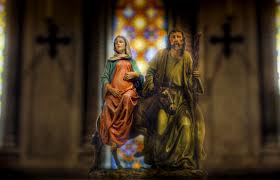Reflecting during Advent on life’s big surprises
Common wisdom holds that it always is in our best interests to be watchful, to remain on alert when going about daily life. Otherwise, we might be ambushed by unforeseen developments, surprises that disrupt our best laid plans or shake our hopes.
Nov 20, 2014

By David Gibson
Common wisdom holds that it always is in our best interests to be watchful, to remain on alert when going about daily life. Otherwise, we might be ambushed by unforeseen developments, surprises that disrupt our best laid plans or shake our hopes.
Naturally, there are lots of surprises that everyone welcomes, the kind that renew hope and make us want to cheer. The more the better!
The problem is that most of us experience many unpleasant surprises, the kinds that send us searching for consolation.
Perhaps a sudden development at home or work alarms us. Maybe someone we greatly love makes a decision that frightens or unsettles us, leaving us feeling lost, confused. It might come as a blow when a 17-year-old announces out of the blue that he will not go to college, or a spouse refuses help in fighting an addiction, or serious illness takes its toll on a family member.
Then we wonder what is being asked of us, and what steps to take next. Our roles, somewhat clear to us yesterday, are not as clear today.
After some big surprises, life can feel uncomfortably unpredictable. Just when we have our work lives pretty much under control, or when our relationships at home are humming along smoothly, the ground shifts a little or a lot. We may not like this, at least not immediately.
No wonder people become not only watchful, but wary, particularly after one of lifes big surprises results in suffering for them.
But watchfulness, it turns out, is a particular virtue of the Advent season. “Watching is the virtue, the attitude of pilgrims,” Pope Francis remarked at the end of Advent last year. This is a time to “open our souls in watchfulness.”
Wary watchfulness did not seem to be what he had in mind, however. He hoped Christians in Advent would watch “like Mary,” who was anticipating Jesus’ birth. During Advent, he said, “the Holy Spirit moves in the heart of each one of us, forming this prayer within us: ‘Come, come!”’
In Advent, Christians wait expectantly for the surprise of Christmas — the coming of God into the world as we know it. Might the real surprise of Christmas disrupt life for us or prompt a shift in our best laid plans? Yes, but presumably, not a change for the worse.
Think of St Joseph. He is a key biblical model for Advent, someone hugely surprised in a manner that must, at first, have felt sad and unpleasant. We read:
“When [Jesus’] mother Mary was betrothed to Joseph, but before they lived together, she was found with child through the Holy Spirit. . . . Since he was a righteous man, yet unwilling to expose her to shame, [Joseph] decided to divorce her quietly. “Such was his intention when, behold, the angel of the Lord appeared to him in a dream and said, . . . ‘Do not be afraid to take Mary, your wife, into your home. For it is through the Holy Spirit that this child has been conceived”’(Mt. 1:18-20).
Joseph “was following a good plan for his life, but God was reserving another plan for him,” Pope Francis commented last year during Advent. However, since Joseph “always listened to the voice of God,” he “did not persist in following his own plan for his life.”
Furthermore, the Pope continued, after hearing such “bewildering” news about Mary, Joseph “did not allow bitterness to poison his soul.”
No doubt, it can be tough to meet the standard set by Joseph, particularly when we fear that a surprising development may spell suffering for us or others. But here Advent challenges us.
Advent calls us to be watchful. It challenges us to be on the lookout for God’s presence, and God’s questions for us when life’s welcome, and not-so-welcome, surprises occur.
This is not a call to passivity or inaction when surprises drop into our laps. But it is a call to watch for the coming of the Lord, who is likely to arrive by an unusual route and to invite us to accompany him along it.
When an unexpected development disrupts plans of ours, could it possibly mean that, as with Joseph, God has reserved another plan for us?
Pope Francis often talks about God’s surprises. He once recommended that people ask whether they “are afraid of what God might ask.”
Mary did “not hide her surprise” and “astonishment” when the angel told her “that God, to become man, had chosen her, a simple maid of Nazareth,” the Pope noted. He proposed a question anyone might ask: “Do I let myself be surprised by God, as Mary was, or do I remain caught up in my own safety zone?”
Often “we seek God here, and he waits for us there,” the Pope observed on another occasion. For, “God is a God of surprises. He always surprises us, always, always.”
So be watchful in Advent. Try to see how God is mysteriously at work in life’s big surprises.







Total Comments:0